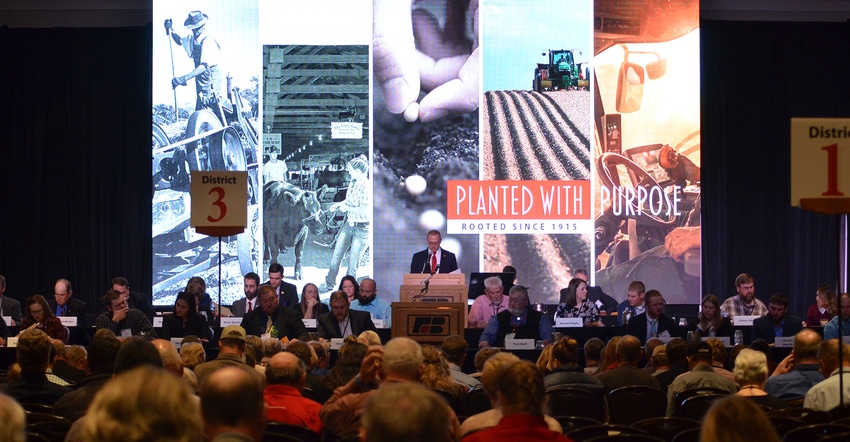
After COVID-19 prevented farmers and ranchers from gathering in-person last year for the Missouri Farm Bureau annual meeting, the organization made up for it this year by including policies surrounding the coronavirus in its 2021 policymaking session.
Nearly 600 farmers and ranchers from across the state gathered Dec. 5-7 in Osage Beach, Mo., to craft resolutions for the Missouri Farm Bureau Federation. And after a year of not meeting in person, delegates took to the convention hall floor for spirited debates on topics ranging from vaccine mandates to feral hogs.
Missouri Farm Bureau President Garrett Hawkins expressed excitement in the delegation’s verve for the issues. “This is what grassroots organizations in action look like,” he told the group last week. “I applaud your enthusiasm. We have a lot of catching up to do from last year’s abbreviated work.”
This was Hawkins first in-person annual meeting at the helm of the state’s more than 134,000 member families. The result was 159 pages of resolutions that define the organization’s directives and legislative policy. Here are the top five issues Missouri Farm Bureau members were fired up about at this year’s annual meeting:
1. Vaccine mandates. One simple line: “We oppose a federal or state COVID-19 vaccine mandate and oppose discrimination based on vaccine status.” But that quickly morphed into three lines, including that the organization opposes any vaccine mandate; requiring any type of COVID-19 vaccine passport; and entering any personal, private COVID-19 related information into any database or registration system.
But it did not come without debate from both sides. Farmers expressed the need for vaccine mandates, while others talked of natural immunity. Some even wanted COVID-19 removed. That brought former MOFB President Blake Hurst to the microphone to state that he did not think the organization wanted to go on record for being against all vaccines. Ultimately, the additional language opposing a vaccine mandate, passport and entering of personal information into a database was approved by the delegates.
2. Feral hog hunting. Members want hunting rights for feral hogs reinstated on state and federal ground. During the height of the COVID-19 pandemic in 2020, the public lands closed. The original language from the MOFB resolutions committee called for a review of public land closure in January 2023. However, farmers took to the floor stating that adequate time has been given for the closure of hunting and killing of feral hogs by the public on state and federal grounds, and starting Jan. 1, 2022, that option should resume.
On one side, individuals spoke on how the closure of the state and federal lands mitigated the feral hog population on said land because it stopped the dumping of feral hogs. However, farmers retorted that the Missouri Department of Conservation has grown more feral hogs than has ever been dumped there. One farmer added, “Let’s eradicate, then worry about catching the people who dump them.” The motion to call for opening of federal and state grounds to feral hog hunting next year passed.
3. Checkoff transparency. Words matter. When a resolution that stated “MOFB strongly supports greater transparency and communications between checkoff councils and producers who pay the checkoff” was proposed, some commodity groups took issue with the word “transparency.” New substitute language struck “greater transparency,” which caused members to raise the question — why?
The change, according to the resolutions committee, was because those exact words made it sound as if there was not enough transparency, and revised language came from the Missouri Beef Council. Also, the committee noted that “transparency” has become part of New Jersey Sen. Cory Booker’s legislation regarding the meatpacking industry and felt the language may cause confusion. The resolution passed without the words “greater transparency.”
4. Boosting broadband. For MOFB member Kyle Durham, high speed broadband by FCC’s definition at 25 megabits per second download and 3 Mbps upload is not enough. He called on the membership to increase both of those speeds to 100. He and other farmers shared that while some companies are receiving grants and installing at 25/3 Mbps in rural areas, those residents at the end of the line do not even reach those lower numbers, adding that higher speed requirement may ensure that downline customers realize 25/3 or better.
Others added that applications farmers use in production and rural residents need, such as telehealth, require higher speeds. The resolutions committee stated it wasn’t opposed to higher speeds, but wanted to achieve the first priority of MOFB based on a membership survey — providing access to high speed. Still, members noted that if you don’t require higher standards, you don’t achieve them. The motion calling for 100 up and down passed.
5. Limiting representation. This was a change to the MOFB bylaws that limits the number of voting delegates to 900, with a county limit of 25 members. Concerns over outgrowing a meeting facility and obtaining a quorum led to the introduction of the change. It passed.
About the Author(s)
You May Also Like






